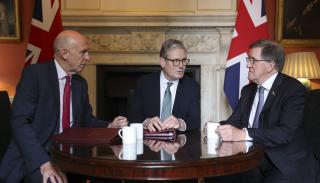Does the new Government’s Strategic Defence Review offer a window for rethinking UK defence policy?

On 13 September 2024, the new Security Policy and Practice working group hosted a ‘Dialogue on the UK Government’s Strategic Defence Review’, supported by Rethinking Security. Over 50 scholars, plus experts working with parliamentary committees, NGOs and think tanks, joined the session. This article captures key points from the discussion while respecting the Chatham House Rule.
On 16 July, new Prime Minister Sir Keir Starmer commissioned a Strategic Defence Review(SDR). Led by Lord Robertson, Dr Fiona Hill and General Sir Richard Barron, the SDR aims ‘to make Britain secure at home and strong abroad’. Its Terms of Reference signals concerns over conflicts in Europe and the Middle East, states that challenge stability and UK values/interests, terrorism, hybrid attacks and climate change. Reviewers are considering inter alia threats, capabilities, human resources, growth, value for money, modernisation, evolving technology and net zero ambitions.
One apparent intention of the review is to strike a reassuring note on policy continuity. Non-negotiable parameters include commitments to the UK’s nuclear weapons, AUKUS, NATO and Ukraine, while the review will look at how to maintain ties with allies in the Indo-Pacific region, the Gulf and the Middle East. The intention to increase defence spend to 2.5% of GDP is restated but a decision on this reserved ‘until a future fiscal event’.
Submissions are invited until the end of September (from ‘serving and retired members of the Armed Forces, the defence industry, the general public, academics, Parliament, and our closest allies and partners, especially in NATO’). There is a portal for submitting responses to a set of ‘propositions’ – and the review team has also solicited inputs from teams within government and from selected experts.
The SDR report is expected in the first quarter of 2025, and Parliamentary bodies such as the Defence Select Committee (once reconstituted in October) are likely to conduct their own enquiries as well as scrutinise recommendations adopted by the Government.
Although the Review offers scope to consider broader issues underlying instability and human insecurity, and opportunities to contribute positively to international and human security, with appropriate divisions of labour between defence and other tools, the Review singles out defence from the more integrated look at wider foreign and security policy issues attempted by previous governments under the ‘Integrated Review’ (2021) and its ‘Refresh’ (2023).
Most of the 23 ‘propositions’ circulated by reviewers for input seek detail in predetermined directions, for example:
-
Propose how UK Defence’s contribution to NATO should be enhanced as a driving requirement of capability and activity, including through prioritising defence export potential
-
Propose how UK Defence acquisition and support (for all classes of equipment) continues to modernise to: maintain pace with key technology, enable the transition to an integrated force, advance interoperability in NATO, and deliver agile, cost-effective acquisition and support at optimum value for money.
-
Propose the digital enablement required by an Integrated Force across all domains and to recommend and prioritise the steps to accelerate this transformation to place UK Defence as a global pacesetter in this area.
Thus the Review is clearly looking for improvements in priority areas – such as support for NATO, Ukraine, and other allies, and achieving domestic resilience – and hoping to detail how to become more modern and integrated in a cost-effective way – rather than pushing for much new strategic thinking or emphasising how defence connects to wider policy and strategic issues. The language of the propositions is clearly inviting for insiders versed in the relevant terminology – but is likely to intimidate outsiders, increasing the risk that defence policy will remain in the hands of a narrow subset of people. This is a marked contrast to the more inviting and participatory approach taken, for example, in neighbouring Ireland.
In this sense, most participants expressed concerns that the SDR has been designed in a narrow, conservative way. It ignores the opportunity to revisit the previous government’s foreign policy vision under the Integrated Review and Refresh; it eschews a national conversation over issues related to nuclear deterrence despite the limited public debate such issues have enjoyed in recent decades and the significant risks and problems in this area; and it offers little entry point for reflection on defence experiences which should prompt lesson-learning – such as reflections on counter-terror and stabilisation efforts to which the UK has contributed in the Sahel. Reflecting male dominance in the sector, only 2 of the 9 reviewers are women, and they are mostly drawn from MoD, NATO or defence industry backgrounds.
At the same time, Lord Robertson’s call for ‘frankness about the choices before us’ hints at some openness to critical engagement – for example, there may be value in pointing out the risks of the Review’s parameters as specified by the Government.
Image Credit: Simon Dawson / No 10 Downing Street via Flickr. Prime Minister Keir Starmer and John Healey, Secretary of State for Defence, meet Lord Robertson, newly appointed head of Government’s Strategic Defence Review in 10 Downing Street, 16 July 2024.